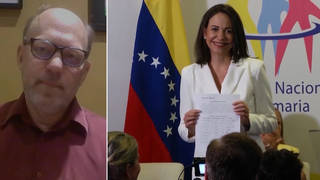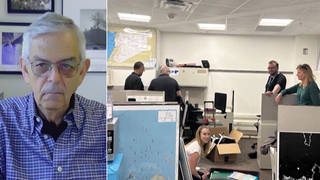
President Clinton last week urged leaders of the companies that most benefit from global trade to listen to those opposed to globalization, telling some of the world’s most powerful politicians and business figures: “Don’t leave the little guys out.” [includes rush transcript]
Clinton, the first president to attend the annual Davos meeting, delivered what amounted to an appeal on compassionate free trade to the World Economic Forum in Switzerland. While endorsing free markets and world trade as indispensable engines for prosperity, he warned his audience of 1,000 entrepreneurs and political figures that it is partly up to them to ease fears on globalization among developing countries, labor unions and environmental activists.
Clinton’s speech is a reflection of how effective protesters were in letting their message be known at the World Trade Organization’s Ministerial meeting in Seattle late last year. About 1,000 activists, many of whom were also present in Seattle, held demonstrations outside the Davos meeting, which attracted the heads of companies that have prospered enormously from free trade, including Nike, Microsoft, Coca-Cola, DuPont, Volkswagen and BPAmoco.
Today, a look at global capitalism through the words of renowned political dissident and intellectual Noam Chomsky.
Tape:
- Noam Chomksy, Professor of Linguistics at the Massachusetts Institute of Technology, political dissident and author of many books, including ??Manufacturing Dissent, ??The New Military Humanism and ??On Language.
Transcript
AMY GOODMAN: Let’s see how the Washington Post put it this weekend, after President Clinton returned from Davos, Switzerland. They said President Clinton urged leaders of the companies that most benefit from global trade to reach out and listen to those opposed to globalization, telling some of the world’s most powerful, political and business figures, “Don’t leave the little guys out.”
Clinton, the first US president to attend the annual Davos gathering, delivered what amounted to an appeal for compassionate free trade to the prestigious World Economic Forum in this alpine village.
The Washington Post goes on to say: While endorsing free markets and world trade as indispensable engines for prosperity, he warned his audience of a thousand entrepreneurs and political figures that it’s partly up to them to ease fears over globalization among less-developed countries, labor unions and environmental activists.
Well, today, we’re going to hear a different view of globalization, and that is from Noam Chomsky. He’s a professor of linguistics at the Massachusetts Institute of Technology, author of many books, well-known political analyst and critic. He gave a speech recently called “Globalization: The New Face of Capitalism.”
NOAM CHOMSKY: The systems of world order that take shape are not the results of natural law, certainly not historical or economic laws. They come from human decisions and human institutions, which can be made in different ways. Margaret Thatcher, her famous slogan was what she called ”TINA”: There is no alternative. That’s ideological claptrap. There’s plenty of alternatives. The alternative that she preferred was one that was contrived and instituted in the interests of certain sectors of overwhelming power, and they’re the ones who, not surprisingly, benefit from the arrangements that they instituted. Whether we choose to accept them or not is another question.
This is also true of what are very misleadingly called “markets.” Markets, in whatever form they take, are also constructed, managed, designed in specific ways in our particular system, and this goes back for hundreds of years. Markets are typically double-edged. Market discipline is a great thing for the poor and the vulnerable. But for the rich and the powerful, they demand and receive protection from the Nanny State. That’s the way markets have always been, with very rare exceptions, and it’s dramatically true in the United States. We call this “free-enterprise economy,” and so on. That’s only very partially true. For one thing, it’s largely managed internally to huge tyrannies called corporations, which are interlinked in all sorts of ways in strategic alliances and so on.
But quite apart from that, if you have the power, you expect protection from the state, and that’s not marginal. If you look over the dynamic sectors of the U.S. economy today — telecommunications, internet, computers, biotechnology, automation run through it — and look into their history, you’ll discover that virtually, without exception, they were developed, designed and paid for by the general public, at public expense. So cost is socialized. Profit is privatized.
Furthermore, risk is socialized. You read that the IMF bails out countries when they get into trouble, but that’s highly misleading. It doesn’t bail out the countries. It bails out the lenders and the investors, makes sure they don’t have to take a risk for their risky, and therefore high-yield, investments. And the country pays for it, the poorer of the country. So you take, say, Indonesia. The people who are paying to ensure that the lenders and investors get paid off are the poor people of the country who never borrowed the money in the first place, and, by and large, quite often, not only they didn’t gain from it, but even suffered from it. But they’re the ones who pay, along with Western taxpayers, who are expected to provide the free risk insurance. And this is true across the board.
It was a year or two ago, a major technical study by two European economists of the hundred leading transnational corporations in the world on the Fortune list. They found that every one of them had benefited substantially from state protection. That means taxpayer subsidy. And about twenty out of the hundred would not have survived as businesses if it hadn’t been for public bailouts.
We’re not talking about marginal facts. This is core elements of the economy. If you personalize it, you find it even more so. So then, the Senate, Trent Lott, House Senate Majority Leader, was described by the London Financial Times a little while ago — the major international business daily — he was described as the chief pork producer in Congress for his rich constituents.
That’s the way the system works. Market discipline is perfect for poor people in El Salvador, or working mothers in the slums. They have to learn responsibility, but not the rich and the powerful. They have to be protected. That’s the truth about neoliberalism. It’s double-edged, and that goes back hundreds of years. That’s a good part of the reason why the third world is the third world and the first world is the first world.
You go back two hundred years ago, they weren’t very different. They diverged enormously, and there are a lot of reasons for that. But one substantial part of the reason is that the third world had market discipline rammed down their throats by force, whereas the first world — England, the United States, Germany, Japan, without exception, every developed country — had a powerful state initiative that protected and developed the economy. And that continues right 'til this moment. So that's what’s called markets. They’re designed in particular ways.
Well, who makes these decisions? In the international arena, the decisions are made by states. But to borrow George Orwell’s phrase, some states are more equal than others. The ones who are most equal are the ones called G7, the seven rich industrial countries. They have an overwhelming effect on state decisions. And of G7, the one that’s, far and away the most equal is, of course, the United States, which since the Second World War has had a position of overwhelming international power — no historical precedent to that — and, of course, has used it to design a world in the interests of powerful sectors within.
Alongside the powerful states, there are the institutions that they’ve designed, the international financial institutions, the IMF and the World Bank, the World Trade Organization — took over from GATT a couple of years ago. Those are institutions of global dominance, global control, which are themselves controlled by the rich countries, and primarily by the United States, which once again has an overwhelming influence.
The states themselves are not autonomous agents. They don’t act as — a degree of autonomy, but to a very large extent, as you’d expect, what they do reflect is the internal distribution of power. So what is called U.S. policy is a reflection, to a significant extent — a very significant extent, and always has been — of the distribution of power within the United States. And that’s no secret, either. That power is largely lodged, especially through the 20th century, and increasingly today, in major collectivist concentrations of power, which are internally tyrannical, linked to one another, and control a substantial, huge part of domestic and international economy, the corporate systems, the industrial and financial institutions, which are increasingly transnational. The extent to which they control the international economy is growing and enormous.
Just to give one index — and there are many — the sales of affiliates, foreign affiliates, of transnationals — so affiliates of General Motors operating abroad, and so on — the sales of affiliates of transnationals alone is considerably greater than the total of world trade. In the last twenty-five years, this is a major and significant change, something without precedent in the history of industrial capitalism.
There has been a huge explosion of financial institutions and financial capital, almost all speculative. Very little of it has anything to do with the real economy, maybe 5%. That is an enormous flow. The flow is now estimated at about a trillion-and-a-half dollars a day, very little of it productive. In fact, the speculative flow, about 95% of it, is mostly destructive, not productive. The degree to which it’s speculative is illustrated by the return time on investments, capital flowing abroad and back. About 80% of it has a return time of less than a week, much of it less than a day even, hours and minutes. The scale is fantastic. The trillion-and-a-half dollars a day is over twice the total foreign exchange reserves of all states together, which means that that has an overwhelming — they can easily overwhelm any government, in fact, any combination of governments.
Well, all of that is highly concentrated, reflects an extraordinary degree of concentrated and interlinked power, and it determines, to a substantial degree, what state decisions are. And it does it many ways. For one thing, the executive branch of the States is largely drawn from these institutions, so, you know, lawyers from corporate law firms, and so on.
Secondly, they virtually own Congress. The extent to which that’s true, and it’s increasing — again, just to illustrate, in the latest elections, the 1998 congressional elections, about 95%, roughly 95%, of winning candidates outspent their opponents, which means if you had the money, you won.
Where did the money come from? Well, by about a ratio of twelve-to-one, business outspent labor. Well, labor represents way more people. So you have a tremendous concentration of ability to buy candidates in the hands of a very small sector, namely the business world, the same corporations that staff the executive.
If you at private contributions, figures that are available indicate that about a quarter of 1% of the population provided 80% of the contributions. Again, that tells you who’s buying the elections. The money isn’t given for charity. It’s given because you expect a return, and the return comes. The money, incidentally, goes to both parties. It may vary a little bit one way or another, but the point is to buy them all. And you get a return.
So, in the 1996 election, for example, as Tom Ferguson, who is a very good political scientist here at U-Mass, has been working on these topics for many years, pointed out that the election was, to a large extent, bought at the — particularly toward the end, by the telecommunications industry, which poured a huge amount of money into it, enough to get Clinton elected, in fact. And they got something, namely the Telecommunications Act of 1996, which is a huge giveaway of public property, maybe on the order of a hundred billion dollars. It was so blatant an act of robbery that it offended a lot of conservative opinion, and got some publicity because of that. Bob Dole, who was running for president, condemned it bitterly as corporate welfare. He then had the facts of life explained to him, and he ended up backing it. There were never any hearings called on this huge giveaway, and there was no media coverage, because the public isn’t supposed to know about these things. This is just the way your lives are controlled and organized.
An even bigger giveaway — this one is incalculable, you don’t know how to measure it in dollars — is the giveaway of the internet. That’s very recent. Four years ago, in fact, it was commercialized, handed over to private power. A year before that, in 1994, Bill Gates, for example, was so — saw so little potential in the internet that he refused even to go to conferences about it. In 1995, he figured what he could do with it. This has been developed for thirty years within the public sector, at public expense, and it was handed over to private power, and it’s now considered, you know, kind of like the leading edge of the economy.
How did that happen? Well, answer is nobody knows. No one knows how the decisions were made to commercialize the internet. It was done somehow — you saw sort of hints and bits and pieces here and there, but it was not a public decision, and it was — you don’t exactly know who made it. It, again, has enormous effects on life, but secret. Well, that’s the way, you know, the executive and parliamentary branch of the government work.
In a way, more important than this, is that private power sets the conditions within which policy is made, no matter who’s in charge. A standard way of referring to it in the economics literature is that global capital markets have veto power over government policy. That’s a little too abstract. Global capital market sounds like some kind of, you know, abstract institution that couldn’t be controlled. But global capital markets means the institutions in whose hands the capital is concentrated. So we’re back to the same nexus of mostly, by now, financial and industrial corporations. That’s capital markets to an overwhelming extent, and, yes, they do have veto power over policy.
The investors and the, increasingly, speculators now constitute what some economists call a virtual senate, a senate that can veto what they consider irrational policy. Irrational policy means policy that is designed to help people, not profits. So, for example, social programs, health, education, labor rights, women’s rights, various things like that, that’s irrational. Efforts to stimulate the economy, improve labor bargaining power, redistribute income, whatever it may be, and that can be punished, in fact, terminated, simply by withdrawing capital from the country. Huge when there’s a trillion-and-a-half dollars circulating per day, totally overwhelming governments. The virtual senate can determine what policy will be. Deviate from their decisions, and the country goes down the tube. For the poorer countries of the world, that’s just — the virtual senate has overwhelming power.
But the same is true even for the rich countries. That was illustrated in the United States in 1992, when there was a little misplaced concern when Clinton came in that he might mean some of the things that he had said during the campaign. And, of course, during the campaign, you have to appeal to voters and sort of say things they’ll like, and so on. And that concern was manifested very quickly in a very sharp increase in bond interest rates. They were driven up, which is a signal that the country is going to go down the tube, capital flow out of it, unless you shape up and ensure, for example, that there is no irrational federal spending, like for the population. You have to have federal spending to control — you know, through sub-socialized cost and risk, but not for the general population.
Now that was followed — that’s what’s called the new Democrats, like the old Republicans — but then policy is set very clearly that way. The liberalization of capital has the effect of opening countries up to this veto power, and, not surprisingly, liberalization of finance has quite consistently led to severe problems, often catastrophe, for the poorer countries. South Korea is a dramatic example. It had a huge and very impressive growth rate without historical precedent. It was compelled under U.S. pressure to liberalize it’s financial markets early in the '90s, and it very quickly went into a huge tailspin. The numbers indicate that it's coming out, but they conceal the fact that a lot of the economy is by now foreign-owned, things that were picked up on a fire sale, basically. Well, that’s the virtual senate, which is able to set policy that way, no matter who happens to be sitting in one or another office.
AMY GOODMAN: Professor Noam Chomsky, recently speaking in Boston about “Globalization: The New Face of Capitalism.”












Media Options